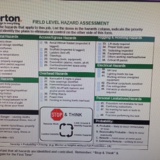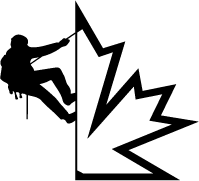Information
-
Document No.
-
Audit Title
-
Client / Site
-
Conducted on
-
Prepared by
-
Location
-
Personnel
Environmental
-
Working on or near energized equipment?
-
When working on connections shut off power if possible.
Ensure what Amperage and Voltage you are working on.
Electrical installations should be carried out by a properly trained and qualified Journeyman electrician.
Two or more journeyman should work together on any energized circuit with the potential to 480volts or more between conductors.
Remove panel covers with care, ensure cover screws or panel space fillers are removed
Ensure ladders are made non-conductive material
Be conversant with the emergency response plan. -
Working alone?
-
Worker shall maintain the batter life of the company provided cell phone to make sure it is ready to use at all times.
Worker shall ensure the cell phone is available for use at all times.
Worker shall notify the office when communication will be unavailable and provide an estimated duration of the communication outage.
Worker shall arrange a check-in schedule at interval appropriate to the nature of the hazard associated with the workers work. -
Awkward body position and/or repetitive motions?
-
Make sure to take frequent breaks from repetitive motions.
Stretch out any muscles as needed -
Potential for slips trips and falls?
-
Identify any potential hazards
Stop work to clear clutter as required
Keep work area neat -
Manual lifting and carrying required?
-
Ensure you know your physical limitations and the approximate weight of materials.
The use of lifting equipment or devices should be considered and employed where practical.
Obtain assistance in lifting heavy objects.
Ensure good grip before lifting.
Employe proper lifting technique (use your knees not your back)
Avoid reaching out.
Pipes, conduit, reinforcing rods and other conductive materials should not be carried on the shoulder near exposed live electrical equipment or conductors.
Be aware of hazardous and unsafe conditions. -
Confined space?
-
Before enter attic or crawl space ensure no environmental hazards exist.
Ensure there is reasonable means of egress from all parts of confined space.
Ensure there is adequate ventilation.
Wear dust mask if required.
Before entering a confined space, make sure someone on site is aware of your location.
Upon leaving the confined space make sure your spotter is aware.
If there is an emergency, medical or building evacuation, someone needs to know your location. -
Restricted access or egress?
-
Identify the access and egress points of the worksite.
Ensure the area is free and clear of clutter and tripping hazards.
Ensure any ramps are strong enough to support the weight of anyone who may use it and their equipment and tools.
Check to make sure walkways have sufficient traction to allow safe movement. -
Potential for falling items from overhead?
-
scan area to identify risks
Take necessary steps to eliminate or control risks
Select proper PPE for risk present -
Extreme temperatures?
-
scan area to identify risks
Take necessary steps to eliminate or control risks
Select proper PPE for risk present -
Solvents or adhesives required?
-
Consult Material Safety Data Sheets (MSDS) whenever a controlled substance is used.
Report when the label of a controlled substance has become damaged or illegible. -
Psychological hazards?
-
Examples:
Stress, violence, fatigue
Personal Protective Equipment
-
Safety glasses required?
-
Omega rated footwear required?
-
Hearing protection required?
-
Work light or head lamp required?
-
Hard hat required?
-
Fall protection required?
-
Respiratory protection required?
-
Arc flash protection required?
Tools
-
Are proper tools available?
-
Are you properly trained for the use of the tools?
-
Are tools in good working condition?
-
Electrical tools should have 3-wire grounding cord and plug (excluding double insulated tools)
On/off switch should be functional and positioned so the operator has access
Only use accessories designed for tool specified.
Saw blades must be designed for the product being cut and the rated speed
Original manufacturers guards must be in place and functional.
Cracked or splintered handles to be replaced.
All tools must be cleaned after use and repairs made before being properly stored.
Tools to be used for designed purposes only.
Follow safe work procedures step by step
Other
-
Are any other potential hazards not listed on this form present at the worksite?
-
Examples:
Excavation, trenching, man lifts, scaffolding, etc.












